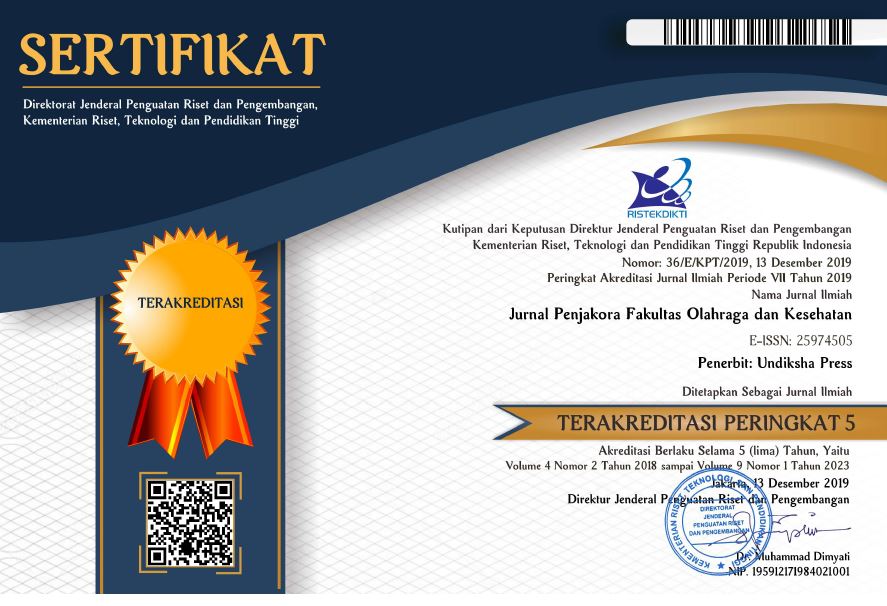PENGARUH PENDEKATAN PEMBELAJARAN DAN MOTOR EDUCABILITY TERHADAP KETERAMPILAN GROUNDSTROKE FOREHAND DAN BACKHAND TENIS LAPANGAN MAHASISWA JURUSAN ILMU KEOLAHRAGAAN FOK UNDIKSHA
DOI:
https://doi.org/10.23887/penjakora.v2i2.11480Abstract
Tujuan penelitian ini untuk mengetahui pengaruh pendekatan pembelajaran dan tingkat motor educability terhadap hasil belajar keterampilan groundstroke forehand dan backhand mahasiswa Jurusan Ilmu Keolahragaan (IKOR) tahun 2014. Pendekatan pembelajaran yang diteliti dalam peneletitian ini adalah pendekatan pembelajaran terpusat dan pendekatan pembelajaran acak. Penelitian ini merupakan penelitian eksperimental semu dengan rancangan penelitian faktorial 2x2. Penelitian dilakukan di Jurusan IKOR FOK Undiksha dengan subjek penelitian mahasiswa Jurusan IKOR yang mengambil mata kuliah TP. Wawasan Kecabangan Olahraga Tenis Lapangan Tahun Akademik 2014/2015. Data dianalisis dengan uji ANAVA 2 jalur (Two Way ANAVA) pada taraf signifikansi (α) = 0,05 dengan bantuan program SPSS 16.0.
Hasil penelitian menunjukkan: 1) Tidak terdapat perbedaan yang signifikan hasil belajar keterampilan groundstroke forehand dan backhand tenis antara siswa yang diajar dengan pendekatan pembelajaran terpusat dan siswa yang diajar dengan pendekatan pembelajaran acak. 2) Terdapat perbedaan yang signifikan hasil belajar keterampilan groundstroke forehand dan backhand tenis antara siswa yang memiliki tingkat kemampuan motor educability tinggi dan siswa yang memiliki tingkat kemampuan motor educability rendah. 3) Tidak terdapat pengaruh interaksi yang signifikan antara pendekatan pembelajaran dengan tingkat kemampuan motor educability terhadap hasil belajar keterampilan groundstroke forehand dan backhand tenis.
References
Abdurahmat, Asep Suryana. 2011. ”Analisis Biomekanik Pukulan Forehand pada Olahraga Tenis”. Jurnal Health & Sport, Volume II, Nomor 2, (hlm.161-174).
Dureja, Gaurav and Sukhbir Singh. 2011. Self-Confidence and Decision Making Between Psychology and Physical Education Students: A Comparative Study. Journal of Physical Education and Sports Management, Vol. 2(6), pp. 62-65, 18 November, 2011.
Hebert, E. P., Landin, D., & Solmon, M. A. (1996). Practice schedule effects on the performance and learning of low- and high-skilled students: An applied study. Research Quarterly for Exercise and Sport, 67(1), 52-8. Diakses dari http://search.proquest.com/docview/218494000?accountid=38628
King, Billie Jean. 1988. Rahasia Sang Juara. Semarang: Dahara Prize.
Lutan, Rusli. 2001. Mengajar Pendidikan Jasmani, Pendekatan Pendidikan Gerak. Jakarta: Direktorat Jenderal Olahraga, Depdiknas.
Maksum, Ali. 2007. Metodologi Penelitian. Buku Ajar Unesa: Surabaya
Murcia et all, 2011. The relationship between goal orientations, motivational climate and self reported discipline in physical education: Journal of Sport Science and Medicine (2011) 10, 119-129.
Nurhasan. 2000. Tes dan Pengukuran Dalam Pendidikan Jasmani. Jakarta: Direktorat Jenderal Olahraga.
Santoso, Singgih. 2011. Mastering SPSS Versi 19. Jakarta: PT Gramedia.
Vertonghen, Jikkemien and Marc Theeboom. 2010. The social-psychological outcomes of martial arts practise among youth: A review. Journal of Sports Science and Medicine (2010) 9, 528-537
Visbeen, Jon. 1987. Tenis. Jakarta: PT. Rosda Jayaputra.
Widiastuti. 2011. Tes dan Pengukuran Olahraga. Jakarta: PT. Bumi Timur Jaya.
Downloads
Published
Issue
Section
License
Authors who publish with the JURNAL PENJAKORA agree to the following terms:
- Authors retain copyright and grant the journal the right of first publication with the work simultaneously licensed under a Creative Commons Attribution License (CC BY-SA 4.0) that allows others to share the work with an acknowledgment of the work's authorship and initial publication in this journal.
- Authors are able to enter into separate, additional contractual arrangements for the non-exclusive distribution of the journal's published version of the work (e.g., post it to an institutional repository or publish it in a book), with an acknowledgment of its initial publication in this journal.
- Authors are permitted and encouraged to post their work online (e.g., in institutional repositories or on their website) prior to and during the submission process, as it can lead to productive exchanges, as well as earlier and greater citation of published work. (See The Effect of Open Access)







